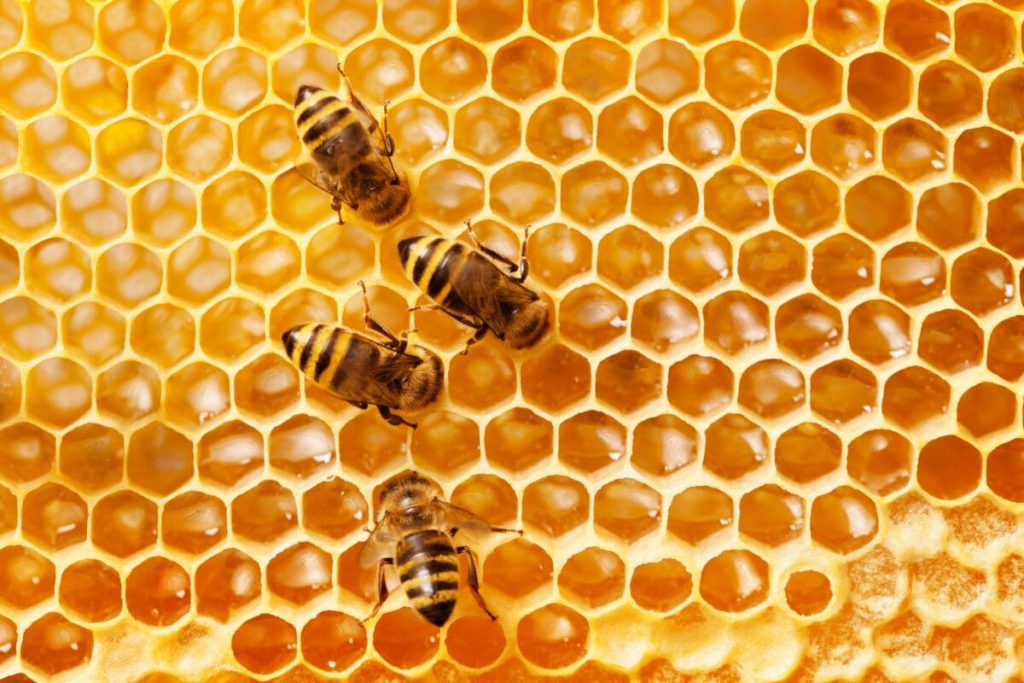
Bees are truly remarkable insects. As social masterminds, these tiny powerhouses are beloved by humans for their honey-producing abilities — but their influence extends far beyond these sweet flavors. In fact, some of nature’s most important bee populations do not actually produce honey; rather, their power lies in their extraordinary pollination abilities.
As mighty pollinators, these insects have the unique ability to help plants flower and produce fruit. As such, we can thank bees for many of our favorite foods — and even for supporting biodiversity.
Sadly, we have taken bees for granted for far too long. Now, due to harmful human behaviors, their populations are declining. Research from the Center for Biological Diversity suggests that an alarming one in four native United States bee species risks extinction.
These issues largely relate to habitat loss, although pesticides, pollution, and climate change all have a role to play. No one simple solution will reverse these trends, but everyday individuals can take many actions to help bees. Keep reading to learn how to save the bees through advocacy or personal changes in behavior — or even by becoming a beekeeper.
Buzzworthy Beginnings: Why Bee Conservation Matters
Bees play a crucial role in our ecosystem and even our economy. These powerful insects pollinate 80 percent of the world’s flowering plants, including many that we depend on for our food supply. Commonly cited projections indicate that bees contribute anywhere from $235 to $577 million to global food production on an annual basis.
Bees also support biodiversity. Their pollination efforts help plants reproduce — and the ensuing improvements in plant diversity support wildlife by providing better food sources and plenty of shelter. What’s more, plant populations kept healthy through reliable pollination can promote regulated water cycles or even soil stabilization.
As threats such as habitat loss and pollution escalate, we risk losing these benefits. This could have a domino effect, with huge implications across the full span of modern ecosystems. Fewer bees could lead to less genetic diversity in plant populations, which, in turn, could make these plants (and eventually, animals, as well) even more vulnerable to ongoing challenges such as climate change.
Creating Habitats for Bees
While beekeepers can play a significant role in sustaining bee populations, the main issues contributing to their decline actually involve habitat loss. This stems, in part, from monoculture, although urbanization and fragmentation have also harmed bee populations.
Habitat loss can have a devastating impact on bees’ nesting patterns while also removing potential sources of pollen and nectar. Thankfully, ordinary individuals can help sustain habitats or even establish new spaces in which bees can thrive. This begins with a simple change in intention: avoid overly manicured lawns and gardens, which do not provide sufficient pollen sources or nesting sites.
Beyond this, key steps include:
- Planting native flowers in many shapes, sizes, and colors.
- Offering nesting sites such as bare soil, dead wood, or even bee hotels.
- Providing shallow water sources that prevent bees from drowning.
Simple Actions to Save and Help Bees Thrive
Even if you cannot commit to beekeeping or creating new habitats, you can do your part to support bee populations. These simple steps should help:
- Buy local honey. Beekeeping calls for a lot of hard work and commitment — and local beekeepers could use extra support as they navigate the complications of tending to their hives. Local products amplify the eco-friendly benefits of beekeeping by limiting the need for pollution-generating shipments.
- Avoid using pesticides. If pesticides are currently part of your gardening routine, consider trying natural alternatives instead. Many insecticides are toxic to bees. Not only do these products make it more difficult for bees to forage, some can even be immediately lethal. Bees may also bring residue from pesticides back to their hives, potentially causing problems for the larvae or even the queen.
- Be open about your bee conservancy strategies. As you chat about gardening with friends and family members, don’t hesitate to mention your goal of supporting bee populations. Explain which steps you’ve taken to help bee populations — and why.
Raising Your Voice for Bees
Individual behavior matters, but we will not make significant progress improving conditions for bees without a concerted, public effort. Policymakers need to be heavily involved — and they need to know that the public cares. Take these steps to advocate for bees:
- Contact local officials. Many legislators have a limited understanding of bees and the myriad of environmental issues that have contributed to their recent decline. Many others are vaguely aware of these concerns but do not realize that the public is worried about vulnerable bee populations. Get in touch and make your perspective known. At minimum, vote for candidates who support critical environmental initiatives that promise to preserve bee habitat and address climate change.
- Contribute to bee-centric organizations. Many nonprofit organizations are entirely dedicated to preserving bee populations. The Bee Conservancy is one of the most notable names in bee conservation, but organizations such as the Xerces Society for Invertebrate Conservation also need support.
Beekeeping 101: Take Your Commitment to the Next Level and Become a Beekeeper
The opportunities highlighted above can certainly make a difference, but another option is also available: beekeeping. As bee colonies decline, beekeepers can play a valuable role in maintaining pollination and even stabilizing the bee population.
Thanks to the hard work of beekeepers, experts have been pleased to highlight modest improvement in outcomes among honeybees, even as their natural habitats continue to suffer. As bee researcher Nathalie Steinhauer explains, “It is not a bee apocalypse.” She adds that beekeepers deserve much of the credit for this lack of apocalypse, especially as they have found new strategies for recovering from major losses.
If you would like to join this movement, you will be pleased to discover that the learning curve is nowhere as significant as it seems. Another source of comfort: initial expenses are often lower than novice beekeepers expect — and returns on investment may be far higher than anticipated.
Getting Equipped
Prior to embarking on your beekeeping adventure, consider taking a class or shadowing an experienced beekeeper so that you know exactly what to expect and how to navigate the many complications that could arise along the way. As you learn how to become a beekeeper, you will become familiar with essential equipment, including:
- Hive tool. Capable of opening seals created by industrious bees, this useful contraption features a hook on one end, plus a chisel-style blade on the other. It is strategically designed to limit disruption to the hive environment.
- Smoker. Transforming otherwise aggressive bees into surprisingly docile insects, smokers obscure alarm pheromones from guards.
- Protective gear. Offering the ultimate safeguard against stings, protective essentials such as jackets and gloves are purposefully designed to accommodate novices, who may otherwise engage in behaviors that are more likely to lead to stings. Many beginners opt for full-body bee suits, although anything with a veil should be sufficient.
Beekeeping Rewards
Beekeeping can be a wonderfully rewarding pursuit. It provides an excellent opportunity to connect with nature while also promoting a tangible form of skill development. Other advantages include:
- Joining a thriving community. The beekeeping community is truly passionate. Drawn together by their shared passion for bees and their fierce determination to improve the environment, beekeepers from all walks of life regularly meet to discuss their unique hobby, thereby developing a wonderfully supportive community.
- Calming activity. Many beekeepers find their work surprisingly calming. There is a meditative component to beekeeping, which can feel like a needed escape from the hustle and bustle of everyday life.
- Honey! This is one of the most obvious benefits of beekeeping and should certainly not be discounted. Honey is delicious and harvesting it can be uniquely satisfying.
Learn More About Beekeeping
As you continue to entertain the possibility of becoming a beekeeper, don’t hesitate to seek insight and support from trusted resources. From classes to books and even podcasts, there are many ways to learn about the art and science of beekeeping. Top options include:
- Bee Culture. As a trusted magazine, Bee Culture offers one of the best solutions for keeping up to date with the quickly moving beekeeping community. Don’t forget to check out Beekeeping Today — the official podcast from Bee Culture.
- The Backyard Beekeeper. Long a go-to resource for beginning beekeepers, this engaging book covers all the essentials. This handbook details essential techniques and also provides plenty of helpful photos to illustrate the intricacies of beekeeping.
- The Pollinators. For your next movie night, check out The Pollinators — a fascinating documentary about migratory beekeepers and their efforts to pollinate critical crops. This inspirational and uplifting film will leave you feeling deeply motivated to take action.
The Sweet Rewards of Bee Advocacy
From beekeeping to grassroots movements or even changing how you care for your lawn, you have the power to make a difference on behalf of the world’s most humble and industrious insects. Do your part to promote biodiversity and sustainable food systems — you just might find the makings of a rewarding hobby or way of life!
As you seek additional opportunities to promote wildlife conservation, look to Unity Environmental University for inspiration. An especially compelling opportunity? Our Master of Professional Science in Wildlife Ecology and Management.
Through targeted coursework, our online MS in Wildlife Ecology and Management will help you not only expand your understanding of environmental issues but also actively advocate for change. Reach out today to get started.
Sources
- https://www.pbs.org/newshour/economy/struggling-beekeepers-stabilize-u-s-honeybee-population-after-nearly-half-of-colonies-died-last-year
- https://apnews.com/article/honeybees-pollinator-extinct-disease-death-climate-change-f60297706e19c7346ff1881587b5aced
- https://thebeeconservancy.org/?gad_source=1&gclid=Cj0KCQjwhb60BhClARIsABGGtw8DNYTik-WJwTo_RzjTeviywJ2mmv5NB3ZZtrlYJGNy0rwGXueCSHAaAh2AEALw_wcB
- https://www.biologicaldiversity.org/campaigns/saving-the-insects/native-bees.html
- https://www.backwoodshome.com/beekeeping-basics
- https://www.beeculture.com/magazine



